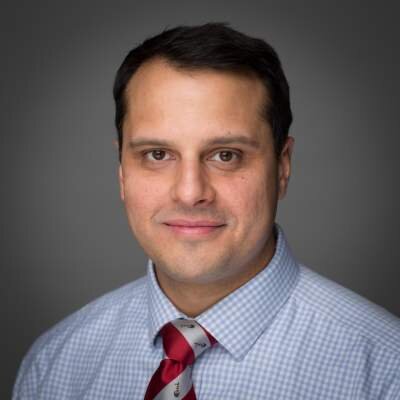ADVISORS
Dr Mitchell Sanders
CEO, ProDevLabs
Dr Mitchell Sanders, PhD is a Serial Entrepreneur, C-Level Executive, and Scientist developing advanced wound care products for the past 30 years with 70 peer reviewed publications and world-wide patents (https://bit.ly/3otr4a3). Dr. Sanders was founder and CEO of ECI Biotech (1998-2016) and his company developed the first infection diagnostic for chronic wounds (Bacterial Status), sold by WoundChek Labs. Dr. Sanders is currently the Chief Executive Officer of ProDevLabs. Over the past 20 years Dr. Sanders has secured over $65M in strategic partnerships for new product development. Dr. Sanders earned his undergraduate degree in Biology from Boston University, followed by an MS and PhD in Biology and Biomedical Sciences at Worcester Polytechnic Institute (WPI). His postdoctoral training was at the MIT/Whitehead Institute in Biochemistry and Host Pathogen Interactions.
Dr Eric O’Neill
Professor of Cell and Molecular Biology,
Department of Oncology
University of Oxford
Eric O’Neill is a Full Professor of Cell and Molecular Biology at the University of Oxford & Adjunct Professor, Systems Biology Ireland, University College Dublin, Ireland.
His research interests lie broadly in the identification of medically relevant biomarkers and treatments; cell and molecular biology; signal transduction; cell signaling; cancer biology; tissue microenvironmental modeling pre-clinical models; originally discovered the hippo signaling pathway (a key pathway of cell fate during development) in cancer; identification of the role those extracellular microvesicles (EVs) in the communication of the cell phenotypes; determination of the relationship between mechanical stress and EVs, influencing stem cell differentiation in bioengineered systems, 3D organoids in vitro, and in pre-clinical in vivo models.
Recently he has establish a spin-out company for high-efficiency biomarker identification.
MR Jeremy Rodrigues
BSc, MSc, MBA, PhD, FRCS (PLast)
Consultant Hand and Plastic Surgeon, NIHR Postdoctoral Fellow, Director of Methodology University of Oxford
Jeremy is an NHS Consultant Plastic Surgeon. He completed clinical and academic training in Edinburgh, Nottingham, Bradford, Sheffield, The Mayo Clinic, Stoke Mandeville, Oxford, Ganga Hospital, and Chelsea and Westminster.
His research focuses on improving how we measure outcomes in hand and plastic surgery and applying this in different scenarios. These include clinical trials and observational studies and in clinical decision-making solutions. To date, he has secured £5.6million of competitive research funding.
He is interested in evidence synthesis, clinical guideline development, and health service policy. He has held an honorary research fellow at Warwick Evidence (University of Warwick), and both a Scholarship and a Fellowship at The National Institute for Health & Care Excellence (NICE). He is also involved in the development and management of the British Society for Surgery of the Hand's (BSSH) UK Hand Registry (UKHR), and quality improvement in healthcare.
PATRICIA GROWCOTT
Professor of Nursing Technology and Innovation
Florence Nightingale Faculty of Nursing, Midwifery & Palliative Care
Applied Technologies for Clinical Care Research Division
King’s College London
Patricia’s research involves co-designing Medical Devices and Technologies with people who are vulnerable to skin breakdown. The focus is on using individuals’ experiences of devices and healthcare systems to identify shortfalls and to work with device users, designers, engineers, materials specialists and industry to co-design devices and systems to meet personal needs and the needs of health care providers. This includes co-creating and validating digital patient recorded outcome indicators and platforms for remote patient and clinician monitoring of recovery and deterioration in response to treatment and care, to enable troubleshooting interventions and routine data capture. Evaluation of the performance and costs of novel devices answers critical questions as to how, why, why not devices meet patients’ needs.
Patricia’s background is in hospice–based clinical nursing. The lack of suitable technologies and systems to care for patients with extensive skin breakdown in tissue viability, palliative and end-of-life care led to pursuing an academic, translational research career at King’s College.
Professor Zhanfeng Cui
Director ,Oxford Center for Tissue
Engineering & Bioprocessing,
Department of Engineering Science,
University of Oxford
MR MATT POTTER
Consultant Plastic Surgeon
Oxford University Hospitals NHS Foundation Trust
DR TOM CLUTTON-BROCK
Clinical Director of the Medical Devices
Testing and Evaluation Centre (MD-TEC)
Birmingham Hospitals NHS Foundation Trust
Professor DR LEE-Laurent APPLEGATE
Clinical Director of Cellular Therapy CHUV, Lausanne, Switzerland
DR INGO SHROETER
former Head of Strategy at PHILIPS
15 yrs Partner at BCG
PhD Ecomonics










